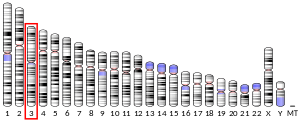EPHA6
Ephrin type-A receptor 6 is a protein that in humans is encoded by the EPHA6 gene.[5][6]
References
- 1 2 3 GRCh38: Ensembl release 89: ENSG00000080224 - Ensembl, May 2017
- 1 2 3 GRCm38: Ensembl release 89: ENSMUSG00000055540 - Ensembl, May 2017
- ↑ "Human PubMed Reference:".
- ↑ "Mouse PubMed Reference:".
- ↑ Manning G, Whyte DB, Martinez R, Hunter T, Sudarsanam S (Dec 2002). "The protein kinase complement of the human genome". Science. 298 (5600): 1912–34. doi:10.1126/science.1075762. PMID 12471243.
- ↑ "Entrez Gene: EPHA6 EPH receptor A6".
Further reading
- Wilkinson DG (2000). "Eph receptors and ephrins: regulators of guidance and assembly". Int. Rev. Cytol. 196: 177–244. doi:10.1016/S0074-7696(00)96005-4. PMID 10730216.
- Xu Q, Mellitzer G, Wilkinson DG (2001). "Roles of Eph receptors and ephrins in segmental patterning". Philos. Trans. R. Soc. Lond. B Biol. Sci. 355 (1399): 993–1002. doi:10.1098/rstb.2000.0635. PMC 1692797. PMID 11128993.
- Nakamoto T, Kain KH, Ginsberg MH (2004). "Neurobiology: New connections between integrins and axon guidance". Curr. Biol. 14 (3): R121–3. doi:10.1016/j.cub.2004.01.020. PMID 14986683.
- Yamaguchi Y, Pasquale EB (2004). "Eph receptors in the adult brain". Curr. Opin. Neurobiol. 14 (3): 288–96. doi:10.1016/j.conb.2004.04.003. PMID 15194108.
- Murai KK, Pasquale EB (2004). "Eph receptors, ephrins, and synaptic function". The Neuroscientist : a review journal bringing neurobiology, neurology and psychiatry. 10 (4): 304–14. doi:10.1177/1073858403262221. PMID 15271258.
- Gale NW, Holland SJ, Valenzuela DM, et al. (1996). "Eph receptors and ligands comprise two major specificity subclasses and are reciprocally compartmentalized during embryogenesis". Neuron. 17 (1): 9–19. doi:10.1016/S0896-6273(00)80276-7. PMID 8755474.
- Aasheim HC, Munthe E, Funderud S, et al. (2000). "A splice variant of human ephrin-A4 encodes a soluble molecule that is secreted by activated human B lymphocytes". Blood. 95 (1): 221–30. PMID 10607706.
- Prevost N, Woulfe D, Tanaka T, Brass LF (2002). "Interactions between Eph kinases and ephrins provide a mechanism to support platelet aggregation once cell-to-cell contact has occurred". Proc. Natl. Acad. Sci. U.S.A. 99 (14): 9219–24. doi:10.1073/pnas.142053899. PMC 123121. PMID 12084815.
- Strausberg RL, Feingold EA, Grouse LH, et al. (2003). "Generation and initial analysis of more than 15,000 full-length human and mouse cDNA sequences". Proc. Natl. Acad. Sci. U.S.A. 99 (26): 16899–903. doi:10.1073/pnas.242603899. PMC 139241. PMID 12477932.
- Clark HF, Gurney AL, Abaya E, et al. (2003). "The secreted protein discovery initiative (SPDI), a large-scale effort to identify novel human secreted and transmembrane proteins: a bioinformatics assessment". Genome Res. 13 (10): 2265–70. doi:10.1101/gr.1293003. PMC 403697. PMID 12975309.
- Ota T, Suzuki Y, Nishikawa T, et al. (2004). "Complete sequencing and characterization of 21,243 full-length human cDNAs". Nat. Genet. 36 (1): 40–5. doi:10.1038/ng1285. PMID 14702039.
- Hafner C, Schmitz G, Meyer S, et al. (2004). "Differential gene expression of Eph receptors and ephrins in benign human tissues and cancers". Clin. Chem. 50 (3): 490–9. doi:10.1373/clinchem.2003.026849. PMID 14726470.
- Kimura K, Wakamatsu A, Suzuki Y, et al. (2006). "Diversification of transcriptional modulation: large-scale identification and characterization of putative alternative promoters of human genes". Genome Res. 16 (1): 55–65. doi:10.1101/gr.4039406. PMC 1356129. PMID 16344560.
This article is issued from
Wikipedia.
The text is licensed under Creative Commons - Attribution - Sharealike.
Additional terms may apply for the media files.



